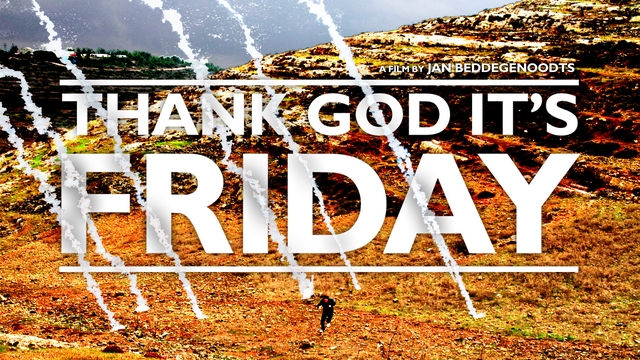Every Friday, residents of the Israeli settlement of Halamish prepare for Shabbat, as their security forces prepare for violence. In this corner of the Occupied Palestinian Territories, resentment among the locals of the encroaching Israeli commune is forcefully expressed in a weekly ritual of protest and bloodshed. Filmed from both sides over two tense years, this alarming doc sees the day of rest turn day of unrest, and the waste of life that it brings.
"Some have the idea that religious settlers are aggressive and dangerous and don't smile", says Tehiya Diteshiam.
"But we're human, OK? Normal." Tehiya lives in the West Bank settlement of Halamish. With its well-swept roads, shaded parking spaces and neat rows of whitewashed houses, it's a direct contrast to the impoverished dry Palestinian village just across the valley.
"We want our land back but they don't want to give it to us", explains one very young Palestinian boy to his mother.
"Until they give it back, we will keep throwing rocks."
Such is the military presence in this region, opportunities for rock-throwing are plentiful. Minor acts of aggression against the nearby settlement are viewed more as a wholesome pastime than ill-advised trouble-making. Young pre-teen brothers gaily speed past their mother to the front-line to roll burning tyres down the hillside into Israeli troops.
As the Friday violence reaches its climax the Palestinian protesters try to reach the settlement and the army fights them back. Inside the settlement teenagers watch the ritual playing out;
"You can see, they're trying to tell us something but we don't pay attention". But their initial confidence falters as the Palestinian determination and the violence escalates;
"They should come and talk to us...We don't want to live like this every Friday. And I hope they don't "
In uniquely reflexive sequences, both communities are given the opportunity to watch the troubling footage of the Friday battles. The Palestinian community is there to watch, offering loud applause. But only a handful of the settlers bother to attend their own screening. Their reaction is scornful, describing the film as overly negative;
"There is no hope here if you look at this film", says Tahiya. But the documentary has troubled her and it's written across her face. With the status quo there can certainly be no hope.
LEARN MORE.
WATCH MORE.
JOIN THE DISCUSSION.
 Every Friday, residents of the Israeli settlement of Halamish prepare for Shabbat, as their security forces prepare for violence. In this corner of the Occupied Palestinian Territories, resentment among the locals of the encroaching Israeli commune is forcefully expressed in a weekly ritual of protest and bloodshed. Filmed from both sides over two tense years, this alarming doc sees the day of rest turn day of unrest, and the waste of life that it brings.
Every Friday, residents of the Israeli settlement of Halamish prepare for Shabbat, as their security forces prepare for violence. In this corner of the Occupied Palestinian Territories, resentment among the locals of the encroaching Israeli commune is forcefully expressed in a weekly ritual of protest and bloodshed. Filmed from both sides over two tense years, this alarming doc sees the day of rest turn day of unrest, and the waste of life that it brings.







